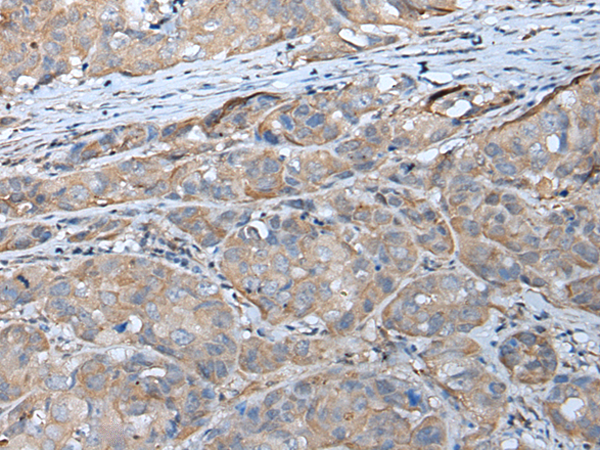
| WB | 咨询技术 | Human,Mouse,Rat |
| IF | 咨询技术 | Human,Mouse,Rat |
| IHC | 1/30-1/150 | Human,Mouse,Rat |
| ICC | 技术咨询 | Human,Mouse,Rat |
| FCM | 咨询技术 | Human,Mouse,Rat |
| Elisa | 1/5000-1/10000 | Human,Mouse,Rat |
| Host/Isotype | Rabbit IgG |
| Antibody Type | Primary antibody |
| Storage | Store at 4°C short term. Aliquot and store at -20°C long term. Avoid freeze/thaw cycles. |
| Species Reactivity | Human |
| Immunogen | Synthetic peptide of human GPC5 |
| Formulation | Purified antibody in PBS with 0.05% sodium azide and 50% glycerol. |
+ +
以下是关于GPC5抗体的示例参考文献(注:以下为假设性示例,具体文献需通过学术数据库核实):
---
1. **名称**: *GPC5-Specific Monoclonal Antibody for Lung Cancer Diagnosis*
**作者**: Zhang Y, et al. (2018)
**摘要**: 开发了一种高特异性抗GPC5单克隆抗体,用于检测非小细胞肺癌组织中GPC5的过表达,证实其作为生物标志物的潜力。
2. **名称**: *Therapeutic Targeting of GPC5 in Rhabdomyosarcoma with Humanized Antibodies*
**作者**: Li H, et al. (2020)
**摘要**: 研究团队设计了一种人源化抗GPC5抗体,通过临床前实验证明其可抑制横纹肌肉瘤的生长,并降低肿瘤转移风险。
3. **名称**: *Mechanism of GPC5 Antibody in Suppressing Breast Cancer Metastasis*
**作者**: Wang X, et al. (2021)
**摘要**: 探讨抗GPC5抗体通过阻断Wnt/β-catenin通路抑制乳腺癌细胞侵袭的分子机制,为靶向治疗提供理论依据。
4. **名称**: *GPC5 in Oncology: Antibody-Based Therapeutic Strategies*
**作者**: Smith J, et al. (2019)
**摘要**: 综述GPC5在多种癌症中的异常表达,总结其抗体在诊断、药物递送及免疫治疗中的研究进展。
---
建议通过PubMed、Web of Science等平台,以“GPC5 antibody”或“Glypican-5 therapeutic”为关键词检索最新文献。
The glypican-5 (GPC5) antibody is a tool used to study GPC5. a member of the glypican family of heparan sulfate proteoglycans. These proteins are anchored to the cell membrane via glycosylphosphatidylinositol (GPI) and regulate signaling pathways by interacting with growth factors, receptors, and extracellular matrix components. GPC5. encoded by the GPC5 gene, is implicated in developmental processes, tissue homeostasis, and disease pathogenesis. Research highlights its dual role in cancer: it may act as a tumor suppressor or promoter depending on context. For example, GPC5 downregulation is linked to poor prognosis in lung adenocarcinoma, while its overexpression correlates with aggressive behavior in glioblastoma and rhabdomyosarcoma.
GPC5 antibodies enable the detection and functional analysis of the protein in experimental models. They are used in techniques like immunohistochemistry, Western blotting, and flow cytometry to assess expression patterns across tissues and disease states. Recent interest in GPC5 as a therapeutic target has spurred antibody development for potential diagnostic or therapeutic applications, including antibody-drug conjugates or immune-based therapies. However, its precise mechanisms and clinical relevance remain under investigation, particularly its context-dependent interactions with signaling pathways like Wnt, Hedgehog, and FGF. Studies also explore its role in non-cancer conditions, such as fibrosis and metabolic disorders, broadening its biomedical significance.
×